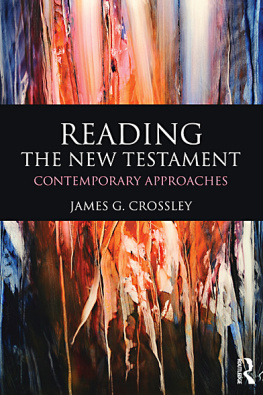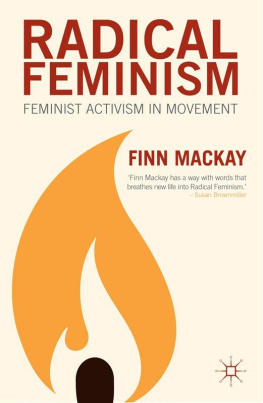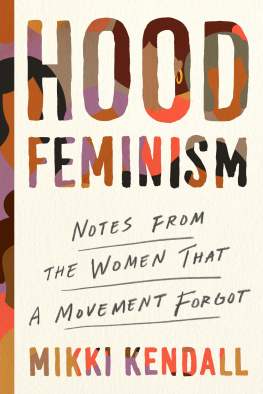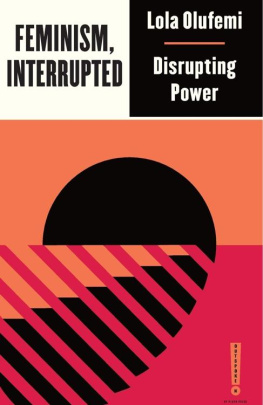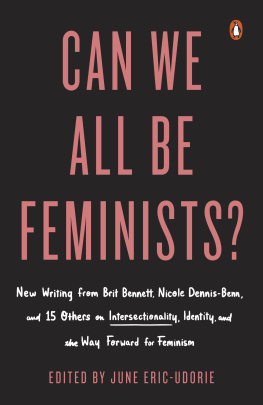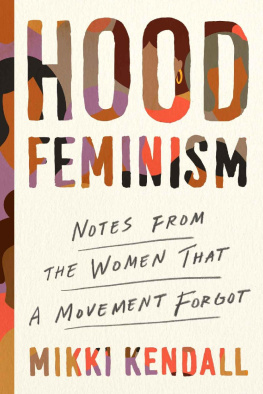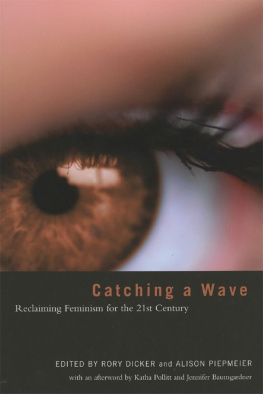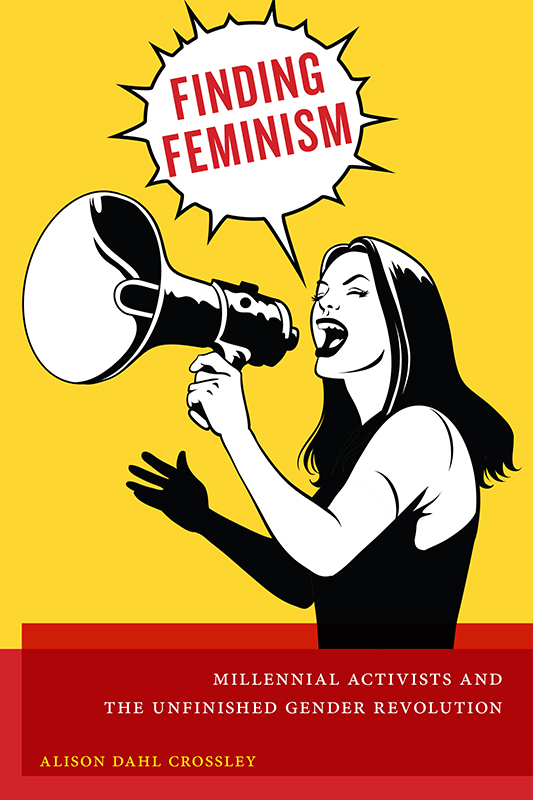
Finding Feminism
Finding Feminism
Millennial Activists and the Unfinished Gender Revolution
Alison Dahl Crossley

NEW YORK UNIVERSITY PRESS
New York
NEW YORK UNIVERSITY PRESS
New York
www.nyupress.org
2017 by New York University
All rights reserved
References to Internet websites (URLs) were accurate at the time of writing. Neither the author nor New York University Press is responsible for URLs that may have expired or changed since the manuscript was prepared.
Library of Congress Cataloging-in-Publication Data
Names: Crossley, Alison Dahl, author.
Title: Finding feminism : millennial activists and the unfinished gender revolution / Alison Dahl Crossley.
Description: New York : New York University Press, [2017] | Includes bibliographical references and index.
Identifiers: LCCN 2016044890| ISBN 9781479898329 (cl : alk. paper) | ISBN 9781479884094 (pb : alk. paper)
Subjects: LCSH : Feminism. | Sex role. | Womens rights.
Classification: LCC HQ1155 .C76 2017 | DDC 305.42--dc23
LC record available at https://lccn.loc.gov/2016044890
New York University Press books are printed on acid-free paper, and their binding materials are chosen for strength and durability. We strive to use environmentally responsible suppliers and materials to the greatest extent possible in publishing our books.
Manufactured in the United States of America
10 9 8 7 6 5 4 3 2 1
Also available as an ebook
I smile at the arrogance of this; that we imagine that our work begins and ends with us.
Cherre Moraga, This Bridge Called My Back: Writings by Radical Women of Color
Contents
I wish to thank the participants in my research for their time and openness. Their enthusiasm was energizing. I continue to be reminded of the importance of their activism and their optimism for a more just and equal future.
Thank you to Verta Taylor. Her brilliant research inspired me to pursue a PhD. When I began the degree, little did I know how much Vertas generosity of time and thoughtful feedback would mean to me, or how her mentorship and friendship would enhance my life. Moreover, Verta lives her life with pizzazz to the max, uncompromising in both intellectual sophistication and fabulousness. She remains a bright light in my life.
I thank Leila J. Rupp and Maria Charles. Leilas intellectual openness and forward-thinking approach have encouraged me to think broadly and with nuance. Her deep knowledge and beautiful writing have driven me to be more thoughtful and precise in my work. I always remember how Leila sees the best in people. Thank you to Maria, who has consistently offered comments and support. Her considerable insight and analytic precision have been very valuable to me.
A number of people at the University of CaliforniaSanta Barbara were instrumental in their support and encouragement as I worked on this project. Thank you to Vertas community of students, especially Heather Hurwitz, Anna Sorensen, Ali Hendley, and the Gender Reading Group. Thank you to Bridget Harr. Thank you to Tracy Royce, Joan Budesa, Nicki Lisa Cole, and Brooke Mascagni for their laughter and fun, and also for their intellectual stimulation. Thank you to Cassandra Engeman, Greg Prieto, and Veronica Montes. I always felt loved and energized by my Santa Barbara peopleDoug Stewart, Tonya Gill, Dasa Francikova, and the extended Kelso familyespecially Carol, Susie and Matt, Missy & Co., Bo and Steve, Polly, Kyle, and Kori.
With gratitude I acknowledge the intellectual community and feminist workplace of the Clayman Institute for Gender Research at Stanford University. It is my great pleasure to work with and learn from these inspiring people, dedicated to equality and inclusivity, especially Shelley Correll, Lori Nishiura Mackenzie, Ann Enthoven, Wendy Skidmore, Natalie Mason, Jennifer Portillo, Sara Jordan-Bloch, Marianne Cooper, Terra Terwilliger, Sandra Brenner, Shivani Mehta, Erika Gallegos Contreras, Becca Constantine, Caroline Simard, Jonna Louvier, Kristine Kilanski, Aliya Rao, Andrea Davies, and JoAnne Wehner. Many thanks to all of these smart women, who have enhanced my research and my life.
Thank you to those who have commented on and supported my work along the way: Pamela Stone, Angela McRobbie, Eileen Zurbriggen, Sarah Soule, Jo Reger, Nancy Whittier, Catherine Corrigall-Brown, Katrina Kimport, Kristin Thiel, Doug McAdam, and Rory McVeigh. I am also very grateful for the friendship and support of Ashley Farmer. To Ilene Kalish, Caelyn Cobb, and Alexia Traganas of NYU Press, thank you.
At Smith and in Northampton, thank you to Professors Nancy Whittier, Margaret Sarkissian, Marc Steinberg, and Fred and Lee-Ann Wessel. At the University of Minnesota, thank you to Shannon Stevens and Heidi Zimmerman. At UCSB, thank you to Paolo Gardinali and the Social Science Survey Center. For research funding, I am appreciative of the UCSB graduate division, the Flacks Fund for the Study of Democratic Possibilities, the UCSB Department of Sociology, and the Clayman Institute for Gender Research at Stanford University
Thanks to my friends from St. Paul Academy, who have been by my side through thick and thin since we were kids: Rhys Conlon, Hilary Gebauer, Matt Felt and Chad Kampe, Dena Larson, and Natalie Durk. Rhys, you have always been there for me in person, on the phone, and by USPS! Thats love. To all of you, my extended family, you are the best. And to my brother, Kent, thank you for your quick wit and curiosity.
I thank my parents, Kent and Dee Ann, whose compassion for others and hard work inspire me. My dad has imparted an intellectual curiosity and openness throughout my life. And thank you to my mom for helping me be a better writer and for always looking on the bright side. Having parents who have been so supportive of and interested in my work has meant the world to me.
Tim, you are luminous. You make me happy to be alive. Your love, energy, and kind heart ramp me up every day. Who better to share life with?
Where Have All the Feminists Gone?
Millennials and the Unfinished Gender Revolution
If you were to hop on a beach cruiser for a ride around Isla Vista, California, you would see that it is a naturally stunning beachside community. Riding past Freebirds twenty-four-hour burrito shop, Woodstocks Pizza, and the Isla Vista grocery co-op, you would notice businesses interspersed with densely packed homes and apartment buildings, with the largely student and Latina and Latino family populations sharing bedrooms or illegally converted garages. As you rolled down Del Playa, the street paralleling the beach, the sun would feel warm on your face, and you would hear the music of a band practicing out of an open window. You would notice houses painted with brightly colored murals, someone rinsing off postsurf session in a wetsuit in an outdoor shower, and a 1968 VW van being slowly driven by a hippy sporting a huge beard. You would probably be incredulous that these tenants live in residences perched overlooking the Pacific Ocean.
On the evening of May 23, 2014, on the streets and in the homes of Isla Vista, twenty-two-year-old Elliott Rodger killed six University of CaliforniaSanta Barbara students and injured fourteen others before killing himself. His rampagewhich included killing his two roommates and their friend, two Delta Delta Delta sorority members, patrons of local businesses, pedestrians, and bike ridersencompassed seventeen crime scenes across Isla Vista. It soon emerged that the rampage was driven by Rodgers hatred of women. In his last YouTube video, he said, For the last eight years of my life, ever since I hit puberty, Ive been forced to endure an existence of loneliness, rejection and unfulfilled desires all because girls have never been attracted to me. Girls gave their affection, and sex and love to other men but never to me.... I dont know why you girls arent attracted to me, but I will punish you all for it.
Next page



